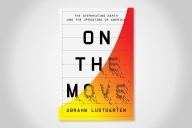You have /5 articles left.
Sign up for a free account or log in.
Does one need an academic terminal degree to identify professionally with that discipline?
Can only someone with a Ph.D. in economics call herself an economist? Do you need a Ph.D. in history to be a historian? How about sociology and sociologist? Biology and biologist? Anthropology and anthropologist?
You get the question.
This question has been bugging me every since I read Upside: Profiting from the Profound Demographic Shifts by Kenneth W. Gronbach.
Throughout the book, Gronbach refers to himself as a demographer. The reason that I read the book in the first place is that I was hoping to get back some to my demographic roots, and I was excited that a demographer wrote a book aimed a general audience.
Despite calling himself a demographer, Gronbach does not have a Ph.D. in the field. (Or in any social science discipline). Rather, his B.A. is in speech/communications.
To be clear, Gronbach never claims any other educational status. He is not trying to pass himself off as an academic demographer, or an academic of any sort. Rather, he calls himself a demographer because he uses (some) demographic methods in his work.
As someone trained as a social demographer, I’ll admit that I’m likely to get a little bit huffy about any perceived unwarranted claims of disciplinary identity.
The sort of demography that Gronbach puts forth as explanatory tools for his arguments in Upside have little overlap with advanced demographic training. What Gronbach calls demography, I see as observation. (Not that there is anything wrong with observation).
My concern is less with Upside and Gronbach, and more with my own blindspots. Is my response to the book typical of academic elitism and credentialism? Would I have enjoyed Upside more if Gronbach’s constant reference to himself as a demographer did not grate on me so?
The book, by the way, is not half bad. You will learn almost nothing about the field of demographics - but you will gain insight into how advertisers think about and utilize demography.
Gronbach has some fun stories to tell about the impact of generational composition on products and brands. Ever wondered why the sales of Japanese superbikes like the Kawasaki Ninja plummeted in the mid 1980s? The answer, according to Gronbach, was the baby bust. Generation X - the ~70 million of us born between 1965 and 1974 - are simply too small in numbers to buy enough fast motorcycles. Baby boomers, those born between 1945 and 1964, number about 80 million. Once the boomers aged out of the risk taking superbike buying years, the number of motorcycles sold was bound to drop.
Well, maybe.
The first thing you learn when you train to be a demographer is that demography is not destiny. Or not really. The world is a complicated place. Generational demographics can explain much. But they don’t explain everything.
What does come across in Upside is just how appealing a character Gronbach is. He is funny, modest, very smart - and a terrific storyteller. Gronbach is willing to make sweeping statements and bold assertions. One might question the validity of some of his arguments, but it is difficult to argue with their entertainment value.
How do you think about professional identities and academic training?
Does one need a terminal degree to identify as a card carrying member of a particular academic discipline?
What are you reading?








